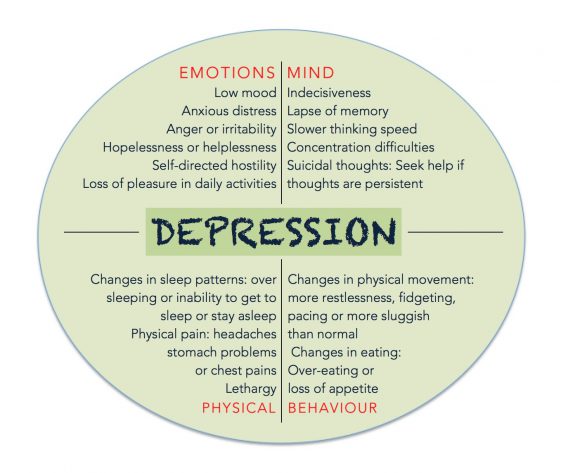PSYCHOLOGY OF US
YOUR RESOURCE LIBRARY
FEELING DOWN BUT NOT CLINICALLY DEPRESSED
I worked my way through graduate school as a waiter. Before I earned a Chartership and could earn money working with clients, I worked 16 hours most days for about five years. This included taking classes, training, seeing clients, and doing research, then waiting tables nights and weekends. Sometimes I would work two 8-hour restaurant shifts, come home, fall into bed and dream about waiting tables. Only to get up and wait tables again. I was overworked and under-rested.
Of course that influenced my mood and my ability to cope with stress. When other life struggles occurred, it was much harder to pick myself up. Even when I was off work and doing something fun, I felt an undercurrent of depression just knowing I had to do it all again soon.
Contents:
What’s the Difference between Feeling Depressed and Clinical Depression?
Warning Signs and Symptoms
Depressive symptoms can be diagnosed as Clinical Depression if:
What’s the Difference Between Feeling Depressed and Clinical Depression?
Looking up information about depression online usually brings up material on capital D Depression, leaving some of us thinking that, it feels bad but it’s not as bad as all that. Plus information is often confusing. Too much of it, polar-opposite symptom variations (too little sleep, too much sleep), as well as clinical classifications that are ever-changing, make it hard to self-diagnose.
Warning Signs and Symptoms
The following symptoms can occur if you have Clinical Depression or sometimes if you are just feeling depressed. Many of us experience a combination of these symptoms at some point in our lives.

Depressive symptoms can be diagnosed as Clinical Depression if:
- they are experienced most of the day, every day for more than two weeks,
- they are experienced most of the day, every day for more than two weeks,
- if symptoms impact your relationships, ability to work or function in everyday life, or if thoughts of suicide or self-harm occur.
- or if thoughts of suicide or self-harm occur.
If you think that you have Clinical Depression, visit your doctor. I provide treatment for Clinical Depression. FIND OUT MORE. However, a medical doctor can conduct a diagnostic evaluation (including a physical exam and lab tests) to determine whether physical conditions might be causing these symptoms.
It’s important to realise that you don’t have to have Clinical Depression to experience depression symptoms. Everyone feels low, drained or worn-out occasionally. Many of the symptoms of Major Depressive Disorder – irritability, lethargy, hopelessness, concentration difficulties – can be normal reactions to stressful life events.
Social scientist, Karla McLaren, points out that ‘Sometimes, depression is a perfectly reasonable response to trouble in your life’. However, when these feelings linger, it means that they are trying to tell you something. Whether it is telling you to slow down, get more sleep, change an unhealthy relationship or seek help, you need to listen to them.
Suppressing or ignoring these signs can make them worse.
Neuroscientist Rick Hanson explains that the brain is a learning organ. What we repeatedly think, feel, and sense slowly shapes our brains. This neuroplasticity means that prolonged and repeated mental states such as depression leave enduring imprints in the brain. These not only impact our future ability to regulate our mood, they can affect our sleep patterns, memory, hormones and our immune system. They can lead to a negative spiralling effect that becomes increasingly harder to change over time.

The good news is that our brain’s neural structure changes continuously throughout our lives. So, by focusing on redirecting our thought patterns and experiences, we can remap our neural structure in positive ways, no matter how old we are.
Find Out More: How Monkey Therapy Helps You Alleviate Depression.
References and Contributors
- Rick Hanson. (2013). Hardwiring Happiness. The New Brain Science of Contentment, Calm and Confidence.
- Karla McLaren. (2010). The Language of Emotions: What Your Feelings Are Trying to Tell You.Robert Plutchik. (1980). Theories of Emotion (Volume 1).
- Dan Siegel. (2010). Mindsight: The New Science of Personal Transformation.
- Bessel van der Kolk. (2014). The Body Keeps the Score: Brain, Mind, and Body in the Healing of Trauma.DSM V. (2013).
- American Psychiatric Association. Diagnostic and Statistical Manual of Mental Disorders. Fifth edition, text revised.
How therapy works
Worksheets and useful information
Creative Process
Feeling Stuck
Stress
Depression
Feeling Down
Anxiety
Guilt and shame
Find out more
What I do differently
Monkey Therapy
Transformational Coaching
Online Therapy
Trauma
Your inner critic
The science behind it
Steps you can take now
Publications
More than CBT
More than IFS
Psychedelics
Neurodiversity
Thank you!
Your message has been sent. We'll contact you shortly
© 2023 The Monkey Therapist. All Rights Reserved. Site Designed By Samantha Ósk
PRIVACY POLICY